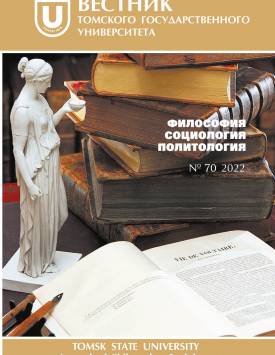From Homo oeconomicus to Homo faber (the origins of postmodern society)
The article considers two fundamental civilizational transitions that have defined the modern development of mankind: the transition from theocentrism to anthropocentrism and the transition from the latter to technocentrism. Namely, technocentrism determines, in the author’s opinion, the key trajectory of this movement. The article shows that, since the Renaissance, the development of capitalism has proceeded in parallel with the tendency to individualization, which both Protestantism and socialism in different variants tried to resist. At the same time, the rationalist approach to man, on the one hand, forms the consciousness of Homo faber, the creative man who, with the help of technology, recreates nature and himself, and, on the other hand, adopts a utilitarian ethic that simplifies human relations to the most primitive senses. At the same time, socio-economic sciences emerge guided by the models of physics, assuming that man can be represented objectively as an external nature, i.e., reducing him only to a material base. Progress, which in Condorcet’s and Saint-Simon’s understanding is moral perfection, is then reduced to the external transformation of man on the basis of science. The reduction of man to a set of simple feelings and needs, regulated rationally, forms the core image of Adam Smith’s political economy. This prepares the spiritual foundation for a new stage of civilizational development, when it is not man who is the measure of all things, but technology. Moral relations are replaced by legal relations, and authentic existence is swapped for non-authentic existence. The state acts as the key agent of all social transformations, regulating human behavior by means of punishments and rewards. Accordingly, a system of “surplus power” emerges, justified by the struggle against subjectivism and the transition to objectivism symbolized by digitalization. Management becomes a science, with management separated from the governed. In the education system, the ideal of creating a harmonious personality is replaced by the ideal of a professional who sells well on the labor market. Relationships in a society built on these principles are becoming increasingly cold, and the individual is becoming less and less of a personality. The author declares no conflicts of interests.
Keywords
anthropocentrism, technocentrism, post-modernity, Homo oeconomicus, Homo faberAuthors
| Name | Organization | |
| Donskikh Oleg A. | Novosibirsk State University of Economics and Management; Novosibirsk State Technical University | oleg.donskikh@gmail.com |
References

From Homo oeconomicus to Homo faber (the origins of postmodern society) | Tomsk State University Journal of Philosophy, Sociology and Political Science. 2022. № 70. DOI: 10.17223/1998863X/70/16
